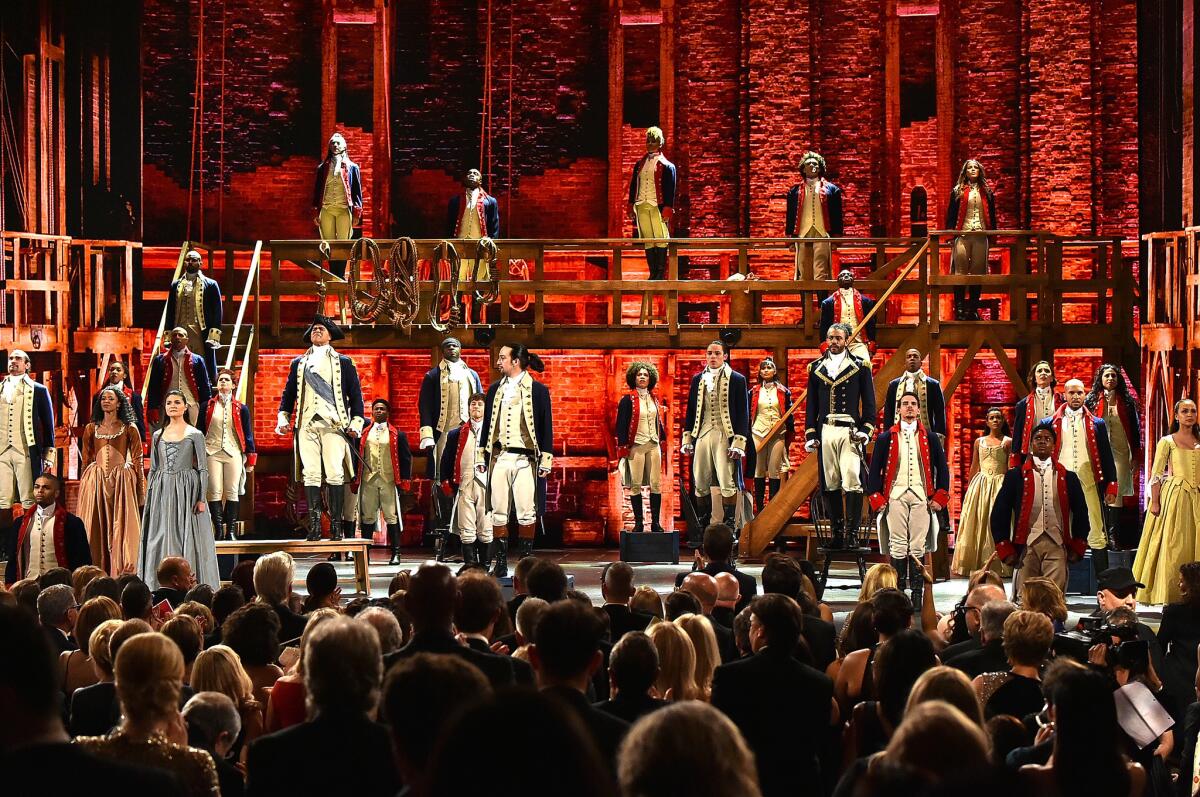With âHamiltonâ now a movie, an old debate reignites about who tells its story

âCancel cultureâ doesnât discriminate between the sinners and the saints; it takes and it takes and it takes.
The #CancelHamilton hashtag bubbled up on Twitter on Sunday, just two days after the âHamiltonâ movie adaptation of the Broadway musical hit streaming service Disney+. to great fanfare.
Critics across the board have taken issue with a whole host of perceived problems, including the erasure of Black and Indigenous people to claims of revisionist history.
Reactions to the controversy have been mixed. One Twitter user tweeted a thread with the hashtag and contrasted pushes to remove Confederate flags and monuments with her take that âon the other hand, weâre really going to read insights from Black people explaining the problematic aspects within Hamilton that whitewash American history and minimize the truth of slavery and say âitâs just a play, donât erase my entertainmentâ?â
Sure, Lin-Manuel Mirandaâs âHamiltonâ was a massive box office success worldwide, but still, many people will see it for the first time on Disney+.
But most people tweeting the hashtag, it seemed, spoke out in outraged opposition to the sentiment â and to cancel culture. Another Twitter user clapped back that âthe fact that #cancelhamilton is a real thing should just show how insane cancel culture is. Itâs a musical, not a history textbook.â
When writer Tracy Clayton joined the conversation, praising the current dialogue around the controversy, âHamiltonâ creator and composer Lin-Manuel Miranda responded with an open-hearted attitude to constructive criticism.
âAll the criticisms are valid,â he tweeted on July 6. âThe sheer tonnage of complexities & failings of these people I couldnât get. Or wrestled with but cut. I took 6 years and fit as much as I could in a 2.5 hour musical. Did my best. Itâs all fair game.â
But this backlash is nothing new. In fact, itâs been happening at least since playwright and poet Ishmael Reed slammed the musical in August 2015, just six months after its Off-Broadway premiere.
The life of Alexander Hamilton, he wrote for CounterPunch magazine, âhas been scrubbed with a kind of historical Ajax until it sparkles.â
In the article, ââHamilton: The Musical:â Black Actors Dress Up like Slave Traders⌠and Itâs Not Halloween,â Reed argued that Hamilton himself was simply not the abolitionist that Miranda makes him out to be. (The Founding Father did, in fact, participate in the slave trade.)
Reed so opposed issues such as the composerâs use of genres rooted in Black history â rock ânâ roll, rap and hip-hop â that he went so far as to write a response play: âThe Haunting of Lin-Manuel Miranda.â
But as Reed told the Observer in 2019, âSomebody wrote that I hated âHamilton,â but I really let Miranda off the hook. Heâs really a sympathetic figure in my play.â
The playwright seemed to focus his energy on the racist acts of Hamilton the man, rather than âHamiltonâ the musical. Yet when the ghosts of those excluded from the show â including enslaved Africans and Native Americans â visit Manuelâs character, Reed is echoing a long line of critics.
RenĂŠe Elise Goldsberry won a Tony for playing Angelica Schuyler in âHamilton,â and now her showstopping song âSatisfiedâ is captured on film in the Disney+ release.
Indeed, much of the #CancelHamilton debate boils down to the fact that, while the critiques themselves havenât changed much over the years, the social and political moment has. The current crises of anti-Blackness and police violence in America fall more in line with radical change than the âmulticultural patriotismâ portrayed by the show five years ago.
In February 2016, Lyra D. Monteiro found the idea of the show representing âObamaâs Americaâ problematic. The expert in early U.S. history and race and ethnic identity argued that the decision to cast Black and brown actors virtually erased any actually African American characters in an essay titled âRace-Conscious Casting and the Erasure of the Black Past in Lin-Manuel Mirandaâs Hamilton.â
Two months later, the New York Times referenced Monteiroâs work in a piece that asked whether the musical painted an accurate portrayal of the politician. Published less than half a year after the 2016 election, the article points out that:
âWhile the most recent critiques of âHamiltonâ have focused on race, some scholars have also noted that itâs an odd moment for the public to embrace an unabashed elitist who liked big banks, mistrusted the masses and at one point called for a monarchal presidency and a Senate that served for life.â
A video of a little girl declaring, âItâs me!â while watching Phillipa Soo in âHamiltonâ is melting hearts and sparking conversations about representation.
The New York Times article also nodded to the work of historian Annette Gordon-Reed, who contended first, that she was a fan, but second, that she found the depictions of the founders and their involvement with slavery problematic.
More recently, she chimed into the #CancelHamilton Twitter debate with the sound analysis that: âWe donât do enough movies, plays, TV shows about⌠Early America. Thatâs why people have such high expectations for a production like #Hamilton. The same often happens with movies about black life. The movie is supposed to show everything, and it canât do that and be any good.â
Sheâs not alone: A large slice of the discussion critiques the founders themselves, but separates fact from fiction.
Those roots run deep too. Scholars on an early American history blog in 2015 thought that Miranda got the most important historical facts right (Ron Chernow, the author of the biography that Miranda based the story on, did fact check the show), and deftly wielded artistic license to highlight human interaction.
Preeminent Hamilton scholar Joanne B. Freeman admitted in 2015 that the musical was in no way perfect in its telling of the manâs life and times but that that wasnât the point. Rather, it was meant to humanize the past and place it in conversation with the present.
In a 2016 piece resurfaced by the current debate, Vox writer Aja Romano cited Tumblr user thequintessentialqueerâs contention that âHamiltonâsâ purpose âis not to romanticize real American history: rather, it is to reclaim the narrative of America for people of colour⌠If youâre watching/listening to Hamilton and then going out and romanticizing the real founding fathers/American revolutionaries, youâre missing the entire point.â
The Vox piece views âHamiltonâ as a masterful piece of fan fiction intended to recast and transform history for the sake of marginalized identities. Miranda himself has written that, âHistory is entirely created by the person who tells the story.â
âHamiltonâ is a beautiful piece of political art, but â as New Yorker writer Emily Nussbaum pointed out â it is just that: neither a history textbook nor an abolitionist manual. Miranda interprets history as he sees fit, a personal choice that chooses to put people of color back in the narrative.
More to Read
Only good movies
Get the Indie Focus newsletter, Mark Olsen's weekly guide to the world of cinema.
You may occasionally receive promotional content from the Los Angeles Times.











